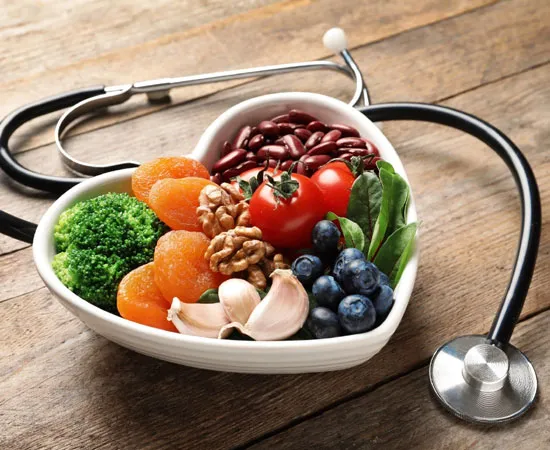- +91-9873452209, +91-9311692209, +91-8375978883
Our clients transformation
[Diabetes, PCOS & Weight Loss Expert in Boston]











[Diabetes, PCOS & Weight Loss Expert in Boston]












Finding the right dietitian for Heart Disease near you in Boston has never been easier! Certified best nutritionist for Heart Disease in Boston for your Lifestyle Wellness, Dt. Nidhi Sawhney provides you Best Diet Plan.
Dietitian for Heart Disease in Boston, Best Dietician for Heart Disease Diet in Boston, Nutritionist for Heart Disease Diet in Boston. There is no 'magic' food to decrease the risk of developing heart disease. You need to eat a healthy diet and have plenty of exercise. High-salt diets increase blood pressure and the risk of heart attack and stroke.
Most of us consume more than ten times the amount of salt we need to meet our sodium requirements (salt contains sodium and chloride). However, there is evidence that plant foods – especially wholegrain cereals, legumes, nuts, fruits and vegetables – may decrease the risk of heart disease.
The foods that best protect against heart disease include:
oily fish – such as mackerel, sardines, tuna and salmon which contain omega-3 fatty acids. This type of fat has been shown to decrease triglycerides and increase HDL-cholesterol levels, improves blood vessel elasticity and thins the blood, making it less likely to clot and block blood flow
some vegetables oils – such as corn, soy and safflower, which contain omega-6 fatty acids, and those containing omega-3 fatty acids such as canola and olive oil. All of these can help to lower LDL cholesterol when used instead of saturated fats such as butter
fruit and vegetables – antioxidants in fruit and vegetables offer protection against heart disease. Fruit and vegetables are also important sources of folate, which helps lower the blood levels of the amino acid homocysteine, which appears to be linked to an increased risk of heart disease
fibre – wholegrain cereals and fruit and vegetables
unrefined carbohydrate sources with a low glycaemic index – foods such as wholegrain breads and breakfast cereals, legumes, certain types of rice and pasta are important for people prone to diabetes because they help keep blood sugar levels in check
legumes and soy – soy protein has been shown to lower LDL cholesterol levels, especially if blood cholesterol levels are high
nuts and seeds – they should be eaten in small quantities, as they are high in kilojoules
tea – some evidence suggests that the antioxidants in tea can help prevent the build-up of fatty deposits in the arteries. The antioxidants may also act as an anti-blood clotting agent and improve blood vessel dilation to allow increased blood flow
alcohol – it is thought that a moderate intake of alcohol may have some potential health benefits. For example, some types of alcohol (such as red wine) may contain protective factors like antioxidants, although this is still being researched. Alcohol also increases the HDL ('good') cholesterol and this helps clear cholesterol from the body. However, a high intake of alcohol increases blood pressure and also tends to increase triglycerides (a type of fat) in the blood, increasing the risk of heart disease. Current guidelines for alcohol intake in Australia recommend no more then two standard drinks per day for men and one for women to reduce the risks of harm related to alcohol
foods containing vitamin E – some studies indicate that vitamin E acts as an antioxidant, helping to protect against 'bad' cholesterol. Good sources of vitamin E include avocados, dark green vegetables, vegetable oils and wholegrain products. It is better to eat foods containing vitamin E rather than take supplements, which do not have the same protective effects
garlic – a compound in fresh garlic called allicin has been found in some studies to lower blood cholesterol
foods enriched with plant sterols – a daily intake of 2–3 g of phytosterols/stanols lowers LDL cholesterol levels by approximately ten per cent in healthy people and in those with high cholesterol and those with diabetes. This intake can be achieved by the consumption of two to three serves of phytosterol-enriched foods like margarine spreads, reduced-fat yoghurts, milk and breakfast cereals.
With years of experience and satisfied customers,
we guarantee quality results.
Nidhi is simply amazzzing! She helped me lose 22 kilos in 8 months. Her plans are practical and easy to do. In fact... Read Full Testimonial
Very good diet plans, customised to my travel routine and hectic lifestyle. Had a wonderful experience with... Read Full Testimonial
I had joined NutriAdvice in Nov with 95 kgs of weight . Life had started to become difficult with my weight . My movements had... Read Full Testimonial
I joined Dr Nidhi Sawhney's diet clinic on the recommendation of one friend. I have had a very pleasant experience iny weight... Read Full Testimonial